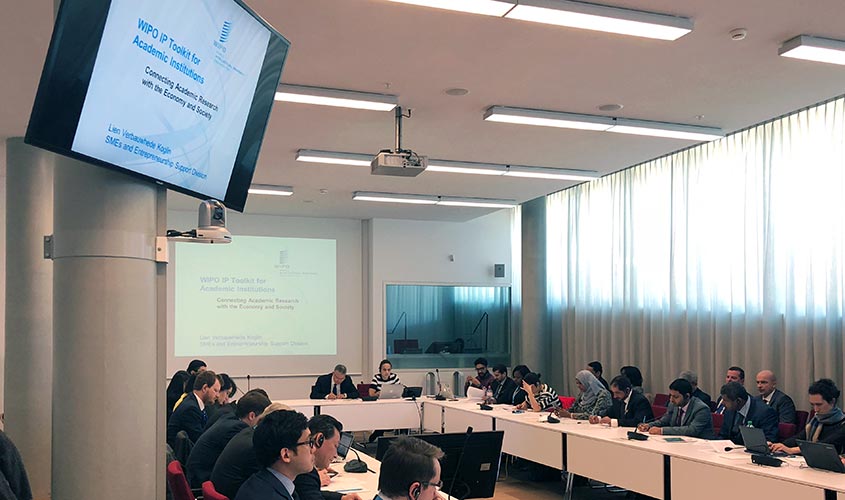New IP Toolkit for Academic Institutions
April 20, 2018
At an event on April 13, 2018, WIPO released its new IP Toolkit for Academic Institutions. The Toolkit represents a “one-stop shop” for academic and research institutions seeking guidance on how to shape and implement their institutional intellectual property (IP) policies.
The launch event took place at WIPO headquarters in Geneva and involved presentations from WIPO colleagues as well as an interactive discussion with delegates from Permanent Missions in Geneva and government officials from various countries.

About the Toolkit
The Toolkit was produced with the help of 18 prominent experts from a range of countries. This international team helped ensure that the product is adaptable to the varied legal frameworks, cultural contexts, and local ecosystems in which academic institutions operate.
It is made up of two volumes:
- Volume 1 comprises the IP policy template, guidelines for customization of the IP policy template, and the policy writers’ checklist. It is intended to help policy makers take more informed decisions when developing their institutional IP policies, as well as to help them find answers to questions concerning their role in the production and distribution of knowledge and their wider contribution towards socio-economic development. Volume 1 was elaborated by an expert team led by Ms. Lien Verbauwhede Koglin.
- Volume 2 contains the academic intellectual assets map, models of agreements, and hypothetical cases. It is a practical, user-friendly explanation of academic intellectual assets and how they can be used, models of the most frequently used agreements for transfer and transactions related to mapped assets, as well as hypothetical case studies that illustrate some of the challenges that academic institutions may encounter in the IP commercialization processes. The content is adapted to be used as a brainstorming or training materials by all innovation stakeholders, including industry partners of academic institutions. Volume 2 was elaborated by an expert team led by Ms. Olga Spasic
The Toolkit is intended to be a set of dynamic, “living” documents, which will be constantly updated and expanded in line with the comments and needs of WIPO member states.
Development of the Toolkit
Over recent years, experts from WIPO’s Small and Medium-Sized Entreprises (SMEs) and Entrepreneurship Support Division (a division within the larger Department for Transition and Developed Countries) have been developing a range of support programs and resources to assist universities to more effectively identify, manage, and commercialize research outcomes.
The Toolkit is a logical next step in this ongoing process, which has been overseen at WIPO by Mr. Michal Svantner, Director of the Department for Transition and Developed Countries.
Complementary website and database
One of the complementary sources of information to the Toolkit is the WIPO webpage dedicated to IP policies for universities and research institutions, which includes a database of IP policies.
The database contains over 650 examples of IP policies from institutions around the world, providing a useful overview of how a range of institutions in various countries have dealt with IP issues.